- Home
- Dave Gross
Pathfinder Tales: Lord of Runes Page 2
Pathfinder Tales: Lord of Runes Read online
Page 2
“I’m more than half certain they were more than fancies,” she said. “But you’re right: He could never satisfy the masters that they were more than eccentric ideas. Everyone always thought it was another part of his hopeless quest to improve the Acadamae’s reputation.”
I was familiar with Ygresta’s arguments that necromancy was not inherently evil. His points were cogent enough, sometimes even compelling. Yet even if I could overcome my disdain for the ghouls and grave robbers, as my enigmatic companion described her colleagues, I would never break a promise to my mother.
“The professor once told me that you could have been one of the best necromancers at the Acadamae, if only you’d chosen to pursue our specialty.”
“Arcane theory was my best subject.” It was in practice that I had failed, not in principle. Even through the long decades when I barely dared to cast a meager cantrip, my knowledge of the arcane served me well.
“Let me guess: you studied evocation.”
“Did the headmaster tell you that?”
“No one told me anything.”
“Why do you guess evocation?”
“Am I wrong?”
“No,” I admitted. Not only had I failed to read her expressions, but she seemed singularly capable of reading me. “But I still want to know why you guessed it.”
“You strike me as the fire-and-lightning type.”
Much as I despise being categorized, I held my tongue. One does not wish to seem defensive.
She continued leading the way to Ygresta’s rooms. I continued to worry at the knot of her identity.
Realizing she was Toff Ornelos’s grandniece narrowed the possibilities. When I had met them, the girls had ranged from ages six to fifteen. This woman was surely not Nicoletta, who married an ambassador to Sargava and likely resided there still. I did not think she was Letizia, whose constant yawning was her singular attribute. Of the others I remembered only names and relative ages. The youngest was Ambra, and her sisters were Filomena, whom Shelyn had blessed with exceptional beauty, and Illyria, whom the goddess had overlooked.
With that thought, I knew the answer.
By virtue of my half-elven longevity, I had seen generations of human children grow to adulthood. Lady Illyria was not the first ugly duckling to become a swan, but hers was the most pronounced transformation I had witnessed. The nose that seemed thin in childhood had grown regal, the fey cheekbones elegant. As a girl, she had barely spoken to me, yet I could now envision her watching the adults in silence while her sisters chattered among themselves.
Past the Hall of Whispers, we came to a row of faculty cottages. At the farthest, she climbed three steps up onto the landing and unlocked the door. Turning with a flourish, she offered me the key.
Also with a flourish, I held the door for her. “After you, Lady Illyria.”
“Ah!” she said, still mimicking me. She straightened a pin holding her hair in a display of purple-frosted roses. “I knew my name would come to you eventually.”
I recalled that Illyria’s mother lived in Westcrown while her father—Fedele’s sickly brother, nephew to Headmaster Toff Ornelos—kept a home in Korvosa. “How is your father’s health?”
“I am making sure he eats properly before I sail to Riddleport next month.”
“To Riddleport?” The city was more popular with pirates than with gentlewomen.
“Some friends are throwing an eclipse party beneath the Cyphergate.”
I resisted the impulse to correct her use of the term. The phenomenon is more accurately an occultation of the sun, not an eclipse. Yet one does not wish to seem pedantic.
Inside, the cottage appeared largely undisturbed since Ygresta’s death. Someone had stripped the sheets from the sagging mattress in the bedroom. We shooed flies from unwashed dishes in the kitchen but were relieved to discover the pantry had been cleared. A film of dust had accumulated on the furniture.
The sitting room featured a pair of overstuffed chairs beside the hearth. A deep depression in one seat indicated Ygresta’s favorite. On the wall behind it hung a portrait of the man. His tall figure was much as I remembered, if withered. It had been decades since we last met, so I had never seen Ygresta’s thinning gray hair, his round spectacles, or his sunken cheeks. Recognizing the portrait as the work of a painter who had died twenty years ago, I wondered how much more time had ravaged Ygresta before death. Considering he was the same age as I, and wholly human, he had enjoyed an exceptional life span.
“They say he slipped away in his sleep,” Lady Illyria said. Sorrow tinged her voice.
“Then the Tender of Dreams kissed his face.” I sketched the wings of Desna over my heart.
Illyria drew the spiral of Pharasma over hers. How strange, I thought, for a necromancer to invoke the Lady of Graves, whose priests abhor the undead. No stranger to the paradoxes of character, I found this anomaly deepened my curiosity about the woman.
After a moment, we broke our separate reveries.
“The library?” I asked.
“Between the dungeon and the torture chamber,” she said, her voice sinister yet whimsical.
We descended a spiraling iron staircase. Magical flames sprang up in glass fixtures, casting our shadows behind the bars of the railings. Arnisant followed us down to the wooden floor and sniffed the corners of the room. Again he growled.
“Arnisant!” He came to heel.
Lady Illyria sniffed. “I can’t blame him. This place is full of weird stinks.”
That was so. The library smelled more like an alchemist’s laboratory. Shelves lined the walls, except where they parted for a fireplace and two doors. One door stood open, revealing a cluttered storeroom. Judging from the odor, the closed door concealed a privy.
Librams, chapbooks, scrolls, folios, and loose manuscripts crammed the shelves. The collection was smaller than expected. At a glance, I estimated I could complete the inventory within a day. The sooner the cottage became available for another tenant, the better pleased the headmaster would be. Pleased enough to answer my inquiries, I hoped.
Knickknacks interrupted the ranks of books. Apart from a devil’s skull and a brass candelabrum resembling a hand of glory, I spied few tokens of necromancy. Between the shelves stood a pair of tables. One lay empty, one stacked with crates overflowing with packing straw. A ledger, brush, and paste-pot lay beside a stack of blank labels, as the custodians had promised.
Ygresta’s desk stood across from the tables, before the little fireplace. Beside it hung a birdcage, empty but for a dry water dish and a carpet of hardened fecal matter. At my approach, a brass lamp flared to life, spilling light on the desktop.
There in the center of the desk, upon a discolored paper blotter, rested a teak box beneath a calling card inscribed with my name.
Without disturbing the card, I scanned the box for magic. Detecting none, I scanned the room. The lamp above the desk and the lights on the stair radiated steady magic. On a few of the shelved books I discerned traces of metamorphosis spells. The latter were likely the residue of simple preservative spells, but their presence suggested more valuable tomes. Those I set aside for further study.
“The professor left his entire library to you?” said Illyria.
“His will names me his executor but indicates no beneficiaries, so in effect he did. After gathering the collection into lots, I will circulate an inventory to the Acadamae librarians and entertain their requests.”
“You won’t keep it for yourself? I thought you liked books.”
“Perhaps one or two volumes.” My library surely already contained any interesting volumes I might find here, but I did not say so. One does not wish to boast.
“In that case, may I be the first to lodge a request?”
“On behalf of the Hall of Whispers?”
“On behalf of myself.”
So, I thought, Illyria was not merely smoothing over her uncle’s sour greeting. She had her own agenda as well. “Name it.”
She
indicated a shelf of chapbooks. “Professor Ygresta’s collection of the Pathfinder Chronicles.”
My own collection was the most comprehensive I had ever seen. It included volumes dating from the very founding of the Pathfinder Society, with many annotated duplicates. In the unlikely event I should find one I lacked on Ygresta’s meager shelf, I would claim it. But I saw no harm in giving Illyria the rest. “Is that all?”
She averted her eyes. “If you aren’t taking them, perhaps also your letters?”
“My letters?”
“Please.”
Her blush appeared genuine, but a sincere appearance is the goal of every ruse. “My letters to Professor Ygresta?”
“Exactly.” She withdrew a pasteboard box from a shelf and lay it before me. I opened the drawer and saw it was full of letters, all addressed to Professor Benigno Ygresta in my handwriting.
Out of a sense of collegial obligation, I had always responded to his letters about current affairs at the Acadamae with some account of my latest excursion. The letters contained nothing not also reported to the Society. Naturally, I never mentioned military, political, or personal matters to someone beneath the aristocracy. I could not fathom what interest they might hold for Lady Illyria.
The foremost letter was my most recent message, a request for Ygresta to speak on my behalf to Headmaster Toff Ornelos, for whom I had so many questions about my admission and education at the Acadamae.
“I’m sorry.” Lady Illyria winced. “I knew it was too much to ask.”
For a moment I considered whether she was flirting with me. Long before I reached the age of maturity, my mother armored me against the attentions of women attracted more to my wealth than to myself. Yet Illyria did not strike me as the type. An Acadamae graduate would be far too intelligent to expect me to succumb to such manipulation.
Whatever her agenda, I could think of no harm that could come from giving her the letters. Moreover, a favor to her was a favor to the headmaster. I still required answers to my questions.
“You will understand that I must review the letters before deciding.”
She brightened. “Naturally.”
“Then let us revisit the matter after I have finished cataloging the library.”
She rubbed her palms together. “In that case, let me help.”
Before I could protest, she drew a wooden disk from her pouch. She wound a string around a slot in its circumference and flicked the disk away. As she uttered the spell, the whirling disk reached the end of the string and vanished. In its place, a whirlwind stirred the loose pages on the nearest shelves.
“Start in there.” She directed her invisible servant toward the storeroom. “Dust every surface, but move nothing.”
While I appreciated her careful instructions, I preferred to discharge my duty in solitude. “Lady Illyria, I assure you I require no assistance.”
“You’ll choke to death on these cobwebs before we can have you to dinner.” She fanned away the cloud already emerging from the storeroom. “There must be a window in one of these rooms.”
She cast a light on the palm of her hand and entered the storeroom.
With a resigned sigh, I sat before Ygresta’s desk. The chair felt too large, but so did my coat. Radovan was not the only one who had lost weight during our journey. Arnisant sat at my foot, sniffing to confirm I had no food to share. I admonished him with a look, and he laid his head on his crossed paws, the guilty beggar. During the worst of our privations on our journey from the Worldwound, I had succumbed to pity and secretly fed the hound a portion of my ration. He learned to linger whenever I ate. Now I had to be strict with him lest he learn to beg whenever I sat before a table.
The box on Ygresta’s desk appeared to be of recent construction, no more than a year or so old. The golden teak was of a type commonly imported to Varisia from eastern Garund, but in the carving I spied the iconography of ancient Thassilon.
I lifted the card bearing my name. Engraved on the box’s lid was the sihedron, a star with each of its seven points notched like one of Radovan’s throwing blades. I had seen the symbol etched on artifacts recovered from the demesnes of the long-lost runelords and their predecessor, the great King Xin, Emperor of Thassilon.
Illyria emerged from the storeroom with a bottle of wine. “Was 4690 a good year?” She presented the bottle like a sommelier.
The label had begun curling at the edges. The bottle was from one of my best vineyards, but an early frost had bruised the grapes that year. “That vintage has not aged as well as others.”
“There’s plenty more where that came from. What’s a good year?”
“Is there any ’84?”
“I see bottles dated back to the Age of Enthronement. You could open a shop with all of these.”
Since I left Korvosa upon my graduation from the Acadamae, it had become my custom to send a gift of each year’s wine to friends and associates in the city. Benigno received only one bottle annually, so I was surprised so much remained. “Did Ygresta stop drinking wine?”
“We didn’t exactly run in the same social circles.”
“No, of course not.” Despite his academic accomplishments, modest though they were, Benigno Ygresta remained a vintner’s son.
“What have you found there, a sihedron?” Illyria sat on the corner of the desk and peered at the box. “You see all sorts of adventurers with those lately.”
“Do you?”
She nodded. “Fortune-hunters have been dredging up Thassilonian artifacts all across Varisia. So many Pathfinders have been exploring the region that they opened a new lodge in Magnimar. Oh, but of course as a venture-captain you already knew that.”
In fact, I did not know of a new lodge, but I had no desire to discuss my estrangement from the Society and its ten anonymous leaders whose motives I no longer trusted.
I opened the box. Inside I found a thick stack of unmarked parchment. The pages fit perfectly inside the box’s velvet lining, suggesting the container had been made to size. I retrieved a magnifying glass and a pair of clean white gloves from the satchel. A cursory inspection offered no clue as to the parchment’s age or origin. Even with the aid of my glass, I could not identify what animal’s skin constituted the material. Removing the parchment, I felt its substantial weight. Its outermost pages, only slightly thicker than the rest, formed its only binding.
“It’s a book,” said Illyria. “A codex, to be precise.”
The study of ancient manuscripts remained one of my abiding interests, so I appreciated her specificity. “You must have earned full marks in Paleography.”
“One of my best subjects.” She made no attempt to disguise her pride.
I flipped through the pages. The interior was as blank as the covers.
“A gift of stationery?” said Illyria. “The professor often said how much he enjoyed reading accounts of your travels. Maybe he intended you to use it as your next journal.”
“Perhaps. But if it was a gift, why not send it to me?”
“Maybe he wanted to give it to you in person.”
“Then why leave a calling card with my name upon it? Except for a recent message I sent him, we had not corresponded in several years. He never told me I was to execute his will. He left me no instructions.”
She picked up the calling card I had set aside. “Perhaps he had just begun making arrangements.”
That was as reasonable a suggestion as any, but it hardly satisfied the questions of the carved box and the blank pages. Setting aside the box, I began to lay down the codex but paused when I noticed the stains on the blotter. Among the usual ink spots and food stains lay a dark spatter surrounding a rectangular void.
“Let me tear that away for you.” Lady Illyria reached for the blotter page.
“No, leave it.” I laid the codex in the blank space within the spatter. Its corners fit one side of the blank. I opened the pages to lie flat, and it fit perfectly within the unblemished space.
“He must
have spilled wine,” said Lady Illyria. “Later he cleaned the pages with a spell.”
That was possible, but I did not like the color. I rubbed a gloved finger across the stain. Faint granular residue remained on the white cloth. “Not wine. Blood.”
“How interesting.”
I raised an eyebrow.
She wrinkled her nose. “I mean, how gruesome.”
The stain was beyond interesting. Ygresta had left me far more than a codex of blank pages. He had left me that which I love best: a mystery.
2
Old Korvosa
Radovan
There were way too many witnesses, so I moved along.
Weaving through the late afternoon crowd, I headed west down the street. Whenever a horse or donkey got too close, I slid into the nearest alley to avoid a commotion. I wasn’t looking for trouble. All I wanted was an intersection without so many people around.
By the time I’d made it halfway across Endrin Island, I was ready to give up. For the crime I had in mind, the streets of Old Korvosa were just too busy—especially this one. I’d have to wait until after sunset to snag myself a sign that read JEGGARE STREET.
Down the street, a gang of dwarves led pony-drawn carts out of a noisy ironworks. With the sun sinking behind them, I couldn’t get a good look at the pinched little faces under their beards. Probably they were locals, nothing to do with the lords of Janderhoff. Still, better safe than stabbed, I always say. Besides, those ponies didn’t want me anywhere near them.
On my right rose a high hill dotted with old manor houses and watchtowers. A crumbling wall encircled all that was left of the fort that started the city of Korvosa. There was nothing I wanted up there, so I cut left, back toward the narrows.
Across from the foundry, brick tenements huddled in groups. Shacks and lean-tos made another ragged city on the rooftops, complete with a highway of planks connecting them.

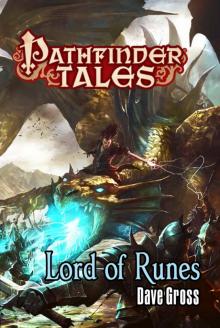 Pathfinder Tales- Lord of Runes
Pathfinder Tales- Lord of Runes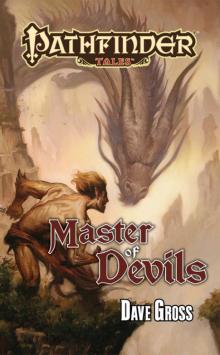 Master of Devils
Master of Devils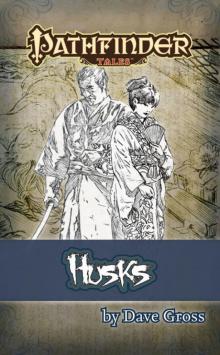 Husks
Husks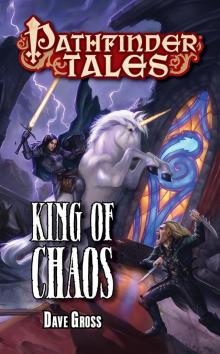 King of Chaos
King of Chaos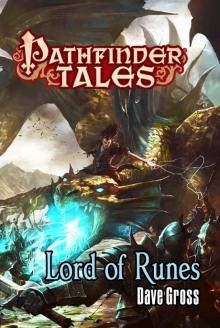 Pathfinder Tales: Lord of Runes
Pathfinder Tales: Lord of Runes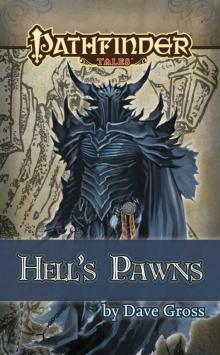 Hell's Pawns
Hell's Pawns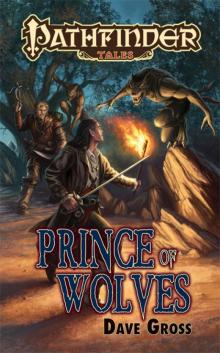 Prince of Wolves
Prince of Wolves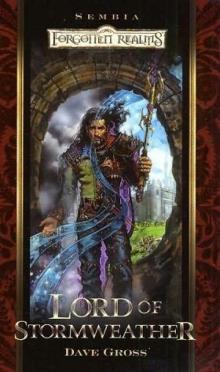 Lord of Stormweather fr-7
Lord of Stormweather fr-7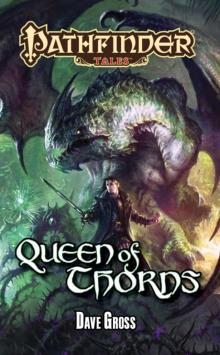 Queen of Thorns
Queen of Thorns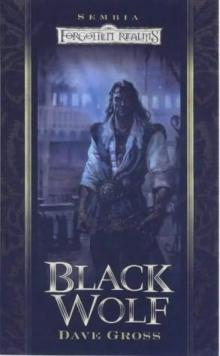 Black Wolf s-4
Black Wolf s-4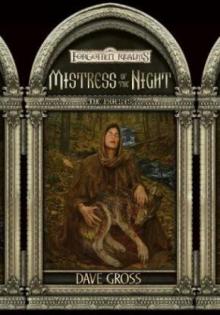 Mistress of the Night p-2
Mistress of the Night p-2